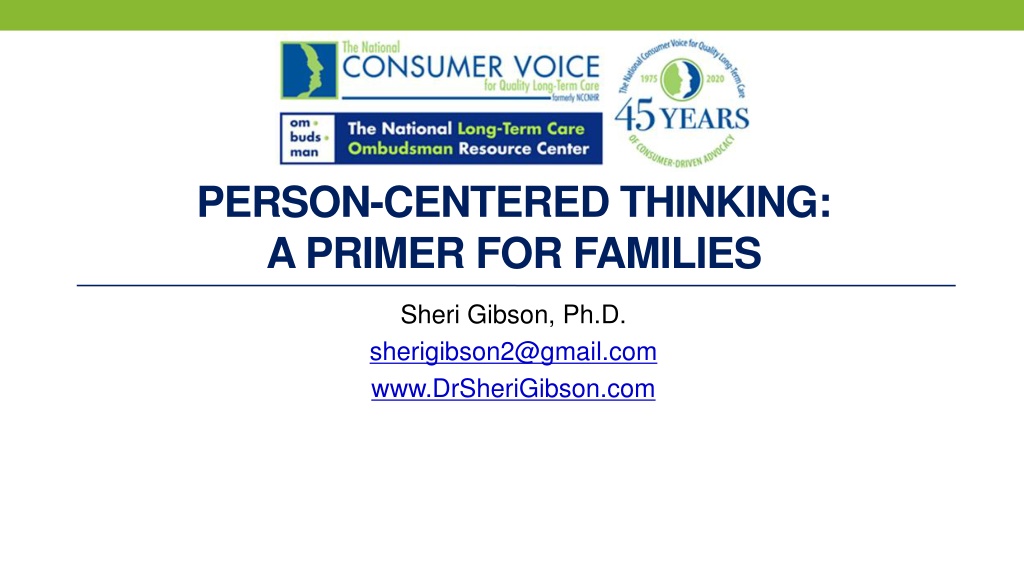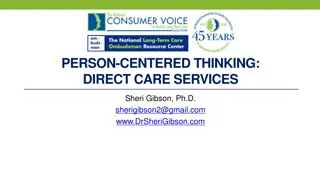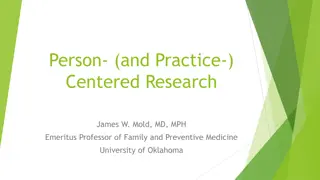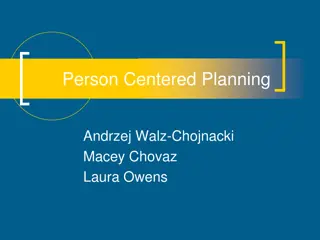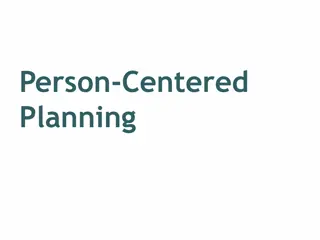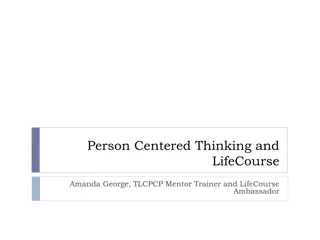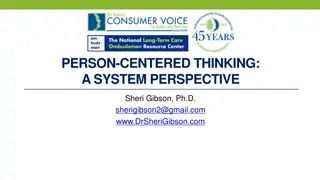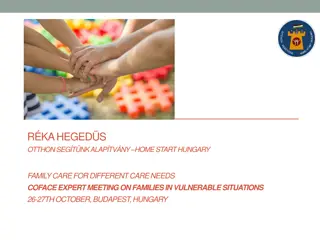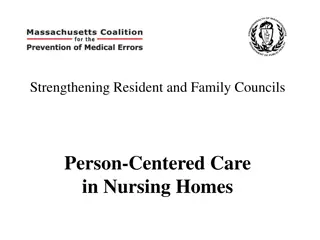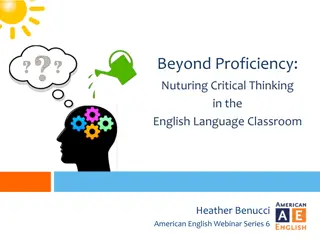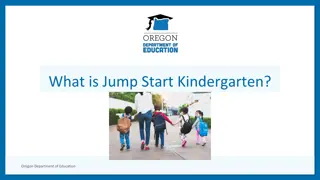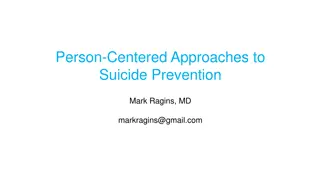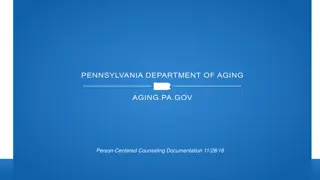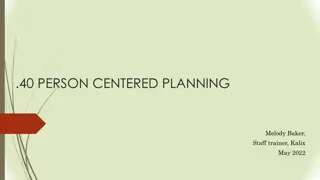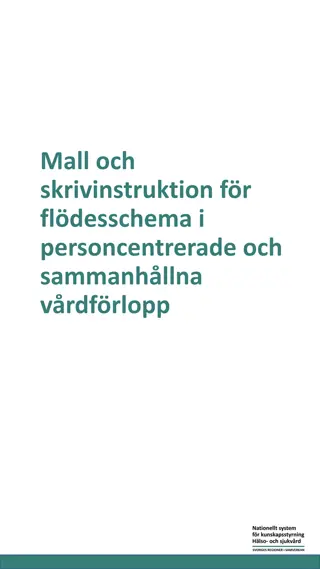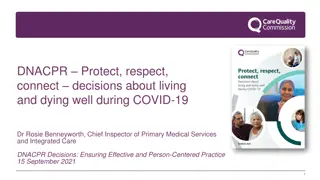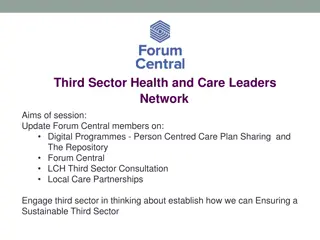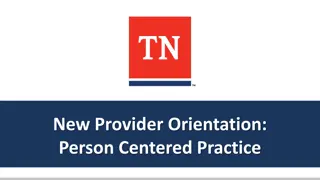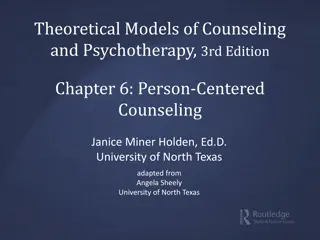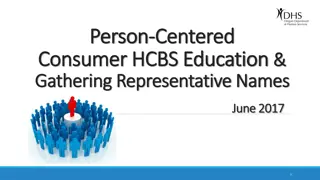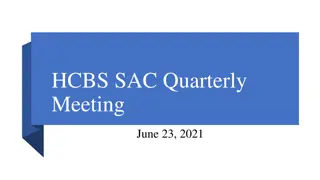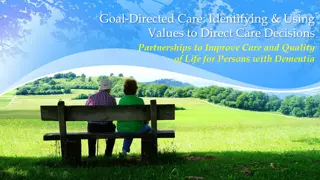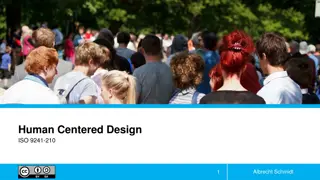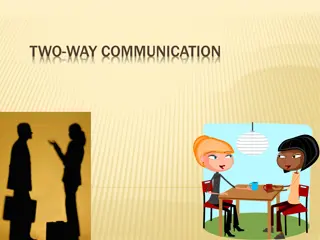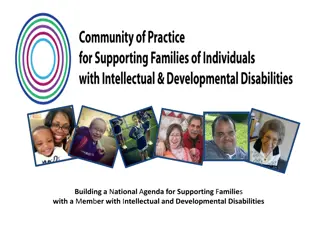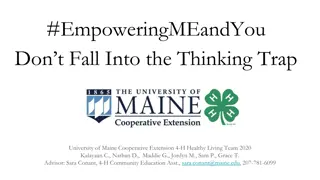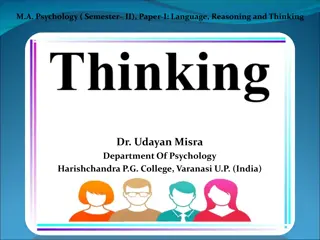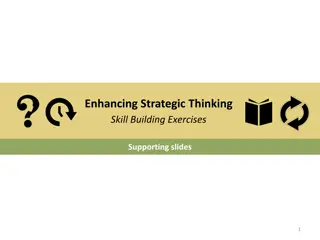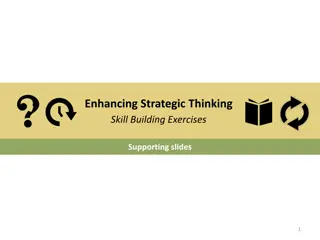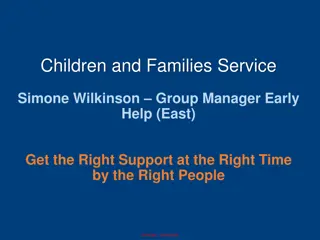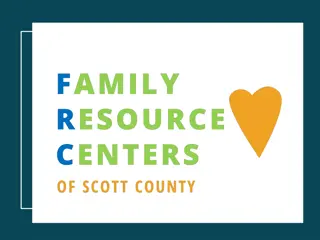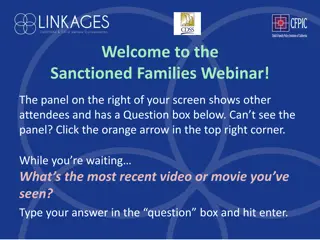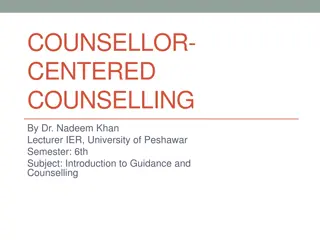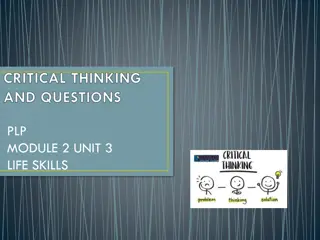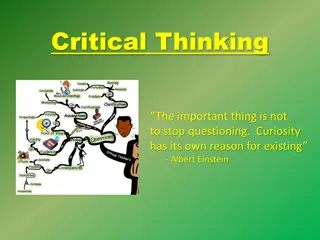Understanding Person-Centered Thinking for Families
Person-Centered Thinking is essential for supporting loved ones in long-term care settings. This primer explores the impact of Person-Centered Thinking on individuals, how to recognize its effectiveness, and ways to promote a culture change in care communities. By prioritizing respect, dignity, information sharing, participation, and collaboration, this approach aims to enhance the quality of care and support received by individuals and their families.
Download Presentation

Please find below an Image/Link to download the presentation.
The content on the website is provided AS IS for your information and personal use only. It may not be sold, licensed, or shared on other websites without obtaining consent from the author. Download presentation by click this link. If you encounter any issues during the download, it is possible that the publisher has removed the file from their server.
E N D
Presentation Transcript
PERSON-CENTERED THINKING: A PRIMER FOR FAMILIES Sheri Gibson, Ph.D. sherigibson2@gmail.com www.DrSheriGibson.com
Intent of this Training What is Person-Centered thinking and how does it impact your loved one? How do we know when it s working and when it s not? How can you support the long-term care community in their quest for culture change? Behavioral and nonverbal indicators to raise awareness of what s working or what s not working
Who is Family? Family refers to two or more people who are related biologically, legally, or emotionally. Consists of individuals who are most meaningful and supportive to the individual. Blood relatives, adoptive parents, adoptive kids, legal guardians, extended family, same-sex or opposite-sex partners, and friends. The person (if competent) defines family and determines the degree of family involvement in his or her care. 4 Bass (2012); Institute for Patient- and Family-Centered Care
Carl Rogers Creator of Person-Centered therapy -Empathy at the core of therapeutic change -Clients are viewed through the lens of potential -Therapist exhibits positive, non-judgmental regard
What is Person-Centered Thinking? Respect and Dignity. Providers listen to and honor the perspectives and choices of the person and his or her family, and incorporates that knowledge into their care. Information Sharing. Providers communicate with the person and family, sharing complete and accurate information in ways that are useful and allow the person and family members to fully participate in decision-making. Participation. The person and family are encouraged to participate in decision-making at the level they choose. Collaboration. The person and family are included in various collaborative efforts to improve care, education, service delivery, and program and policy development.
Creating a System and Culture of Person-Centered Care Language- reframe Perspective- of knowing people and honoring what is important to them while balancing what is important for them. Listen to how residents want to live Support people in making use of resources to have the life they want to live. Provide the support to assist people with making these things happen.
Five Foundational Beliefs 1. Important questions: Who is this person and what is important to them? 2. Person-centeredness aims to change common patterns of community life. 3. Person-centeredness fundamentally challenges practices that separate people and perpetuate controlling relationships. 4. Honest person-centered planning can only come from respect for the dignity and completeness of the whole person. 5. Assisting people to define and pursue a desirable future tests the person s clarity, commitment and courage.
Quality of Life and Self-Determination What does quality of life mean to the person? What does self determination mean to the person? Autonomy Dignity of risk informed choice and importance of documentation All of which are germane to long term care communities.
Important to and for Important To: Comfort Happiness Contentment Fulfillment Satisfaction Important For: Health and Safety Being a valued member of the community
Family plays an important role Sharing your loved one s and family-specific knowledge, values, beliefs and cultural backgrounds to aid in the planning and delivery of care. Providing feedback to Administrators can help in developing protocols and procedures that facilitate communication between family members and staff that honors the unique perspectives, values, and needs of each resident receiving care.
Connie Connie s dementia had worsened and she had multiple chronic health conditions. Recently, she required a catheter. In her sleep and while awake, Connie appeared to pull at the catheter tube taped to her leg. To protect Connie, nursing staff attempted to use methods of distraction, and had positioned her near the nurses station to keep eyes on. Staff were at a loss as to how to keep her from pulling at the catheter tube. Her sister knew something the staff didn t: Connie had severely sensitive skin. Staff treated her itching with antihistamine cream and continued to monitor her.
This is Person-Centered Care Recognizing the cause of Connie s scratching is person-centered care. Using the individualized intervention is person-centered care. Advocating for someone you love is person-centered care. Honoring a resident s preferences is person-centered care.
Tough Choices during COVID-19 Communication can be challenging during a global pandemic. You have resources: The Long-Term Care Ombudsman program (visit https://theconsumervoice.org/get_help to locate a program) National Consumer Voice website (www.theconsumervoice.org) Stay connected to your loved one through phone calls, video calls, cards, letters, window visits. Provide statements of encouragement and listen for signs indicating emotional distress or physical decline.
From the Mud, grows the Lotus Adversity allows opportunity for growth and creativity; Person-Centered Thinking is a Strength-Based philosophy of being with people, not doing to people; Person-Centered Thinking creates systemic change that reverberates across all levels of care and, ultimately, affects your loved one and you. You can make a difference!
Person-Centered Care Resources NORC Person-centered care - https://ltcombudsman.org/issues/person-centered-care Trauma-informed care https://ltcombudsman.org/issues/trauma-informed-care Consumer Voice Resident-Directed Care/Culture Change https://theconsumervoice.org/issues/for- advocates/resident-directed-care My Personal Directions for Quality Living - Blank Form & Sample A tool from Consumer Voice, with edits by SAGE, for individuals to share what matters to them for person-centered care. Information for LTC consumers - https://theconsumervoice.org/issues/recipients Information for Family Members - https://theconsumervoice.org/issues/family
Resources National Long-Term Care Ombudsman Resource Center (NORC) www.ltcombudsman.org Coronavirus Prevention in Long-Term Care Facilities: Information for Ombudsman Programs https://ltcombudsman.org/omb_support/COVID-19 National Consumer Voice for Quality Long-Term Care (Consumer Voice) www.theconsumervoice.org Coronavirus in Long-Term Care Facilities: Information for Advocates https://theconsumervoice.org/issues/other-issues-and-resources/covid-19 Coronavirus in Long-Term Care Facilities: Information for Residents and Families https://theconsumervoice.org/issues/other-issues-and-resources/covid-19/residents-families
Connect with us: www.ltcombudsman.org ombudcenter@theconsumervoice.org cid:image003.jpg@01CFB310.A36779F0 The National LTC Ombudsman Resource Center cid:image004.jpg@01CFB310.A36779F0 @LTCombudcenter Get our app! Search for "LTC Ombudsman Resource Center" in the Apple Store or Google Play This project was supported, in part, by grant number 90OMRC0001-01-00, from the U.S. Administration for Community Living, Department of Health and Human Services, Washington, D.C. 20201. Grantees undertaking projects under government sponsorship are encouraged to express freely their findings and conclusions. Points of view or opinions do not, therefore, necessarily represent official Administration for Community Living policy.
